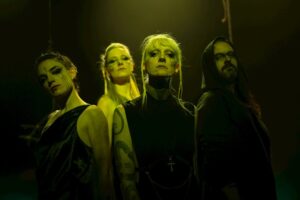SERPENTYNE – The Medieval Rock

Interview with Mark Powell and Maggiebeth Sand
1. What is the concept of band and how did you choose the band’s name?
Maggiebeth Sand: Serpentyne started off with the idea of presenting our own take on mediaeval music, but with no preconceived notions about historical accuracy or anything like that- just taking the songs and tunes from that period and treating them in our own way. There is so much rich source material that is open so so many forms of interpretation.
Mark Powell: We wanted a name with connotations of mediaeval myth and fantasy, so we though of “Serpent,” but that had already been taken. I (Mark Powell) then suggested “Serpentine,” like the lake in London’s Hyde Park, but Maggie then said, “Good, but how about spelling it with a ‘Y?'” Hence, the band was born.
2. How do you position the band in terms of music genre and influences?
Maggiebeth: It incorporates elements of traditional music from various parts of Europe, mediaeval, rock and metal, but also with symphonic-orchestral-choral ingredients. That may sound like a bit of a mixture, but it all seemed to fit together very naturally.
3. How does the symphonic sound of the band reflect the lyrics of Serpentyne?
Mark: The subject matter of our songs, which is related to myths and legends, suggests an epic sound, so setting them in this context just felt right.
4. Your album “The Serpent’s Kiss” represents a wide range of mythology subjects, such as influences from Scandinavian to Greek and more. What is the role of mythology in the band?
Maggiebeth: There is a huge amount of mythological literature- poems, songs and stories, which lend themselves so well to our sound and style. If you’re writing songs, you have a limited range of subjects: relationships and personal experiences are typical themes, and we like the fact that our subject matter is less predictable. It has become our trademark.
5. Which is your contribution to the known myths from the perspective of the lyrics. Do you mention the myths or extend them?
Mark: Some of our sources are obvious. The song “The Serpent’s Kiss,” for example, is derived from the story of Anthony and Cleopatra. On our previous album, “Myths and Muses,” the track “Alexandria” was based on Homer’s Iliad. Yes, we acknowledge the sources, as the songs work best if the listener is aware of the original story, though we like to think that they also stand up on their own.
6. How does the ancient culture influence the modern metal scene?
Maggiebeth: There are many bands, particularly on mainland Europe who write songs based on ancient culture, with songs about the Arthurian and Nordic legends, for example, or who use traditional songs, tunes or poems as a foundation for their compositions. One example is the Swiss band Eluveitie, to which Serpentyne has sometimes been compared.
7. How do you feel regarding the choice of being a support act for the legendary band of Rainbow at the Manchester’s show?
Mark: Quite overwhelmed! As Ritchie Blackmore is one of the rock world’s most established and iconic artists, we’re really pleased that he’s invited us to do this show.
8. How did you manage to become the support act and what are your expectations of this concert?
Maggiebeth: Ritchie sent us a very supportive email soon after we started- he came across us on YouTube. We replied, thanking him, but thought no more about it. We never expected that, five years later, he’d invite us to support him! At the time he first made contact, we were a more semi-acoustic band, so we imagine that we would not have been right to support Rainbow at that time. To be offered this show is a sign of acceptance as players on the worldwide rock stage, so we see it as being the launchpad to bigger and better things.
9. Do you have other tour dates at the moment?
Maggiebeth: June 3rd will be Serpentyne’s debut at Camden Rocks Festival in London, and we have other dates throughout the rest of the year; Conwy Festival in June, Wellingborough and The Asgardian Festival in July, Warrington festival in September amongst other dates around the UK.
10. Is it easy to support a tour at the moment?
Mark: It’s become very difficult, owing to the general devaluation of the music scene. On one hand, you have bands that are so desperate to gig that they’ll play for nothing, or even pay to play- buying tickets for their own gigs in the hope that they can sell them at a profit. On the other hand, you have venues closing down, as they can’t afford to operate. We like to think that the situation will resolve itself in future, but live music is going through a tricky time at the moment.
11. What are your future plans?
Maggiebeth: We are working on album number four, which we hope to have ready by the end of this year. We have just been offered record and publishing deals that we’re looking at, and we’re looking forward to our upcoming gigs- live performance, for us, is still what it’s all about.
Both: Thanks for your interest in Serpentyne, and for your support!

Band information: http://www.serpentyne.com


